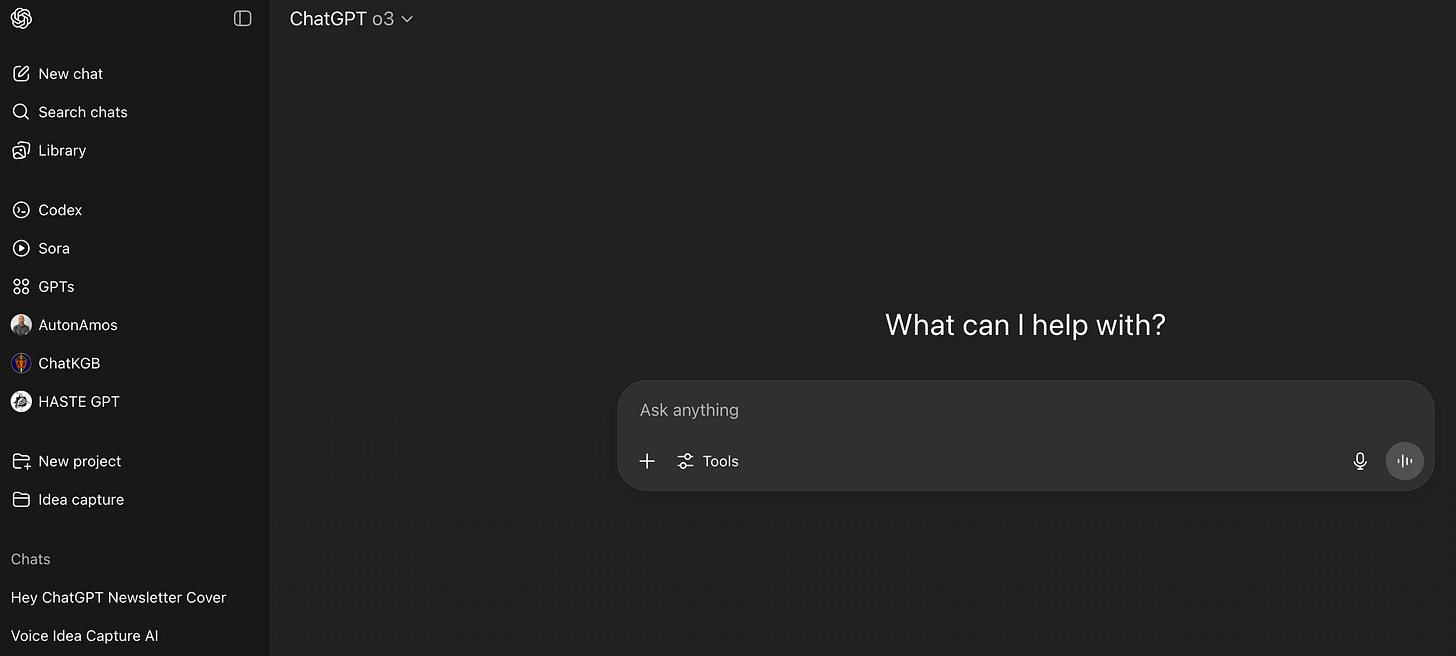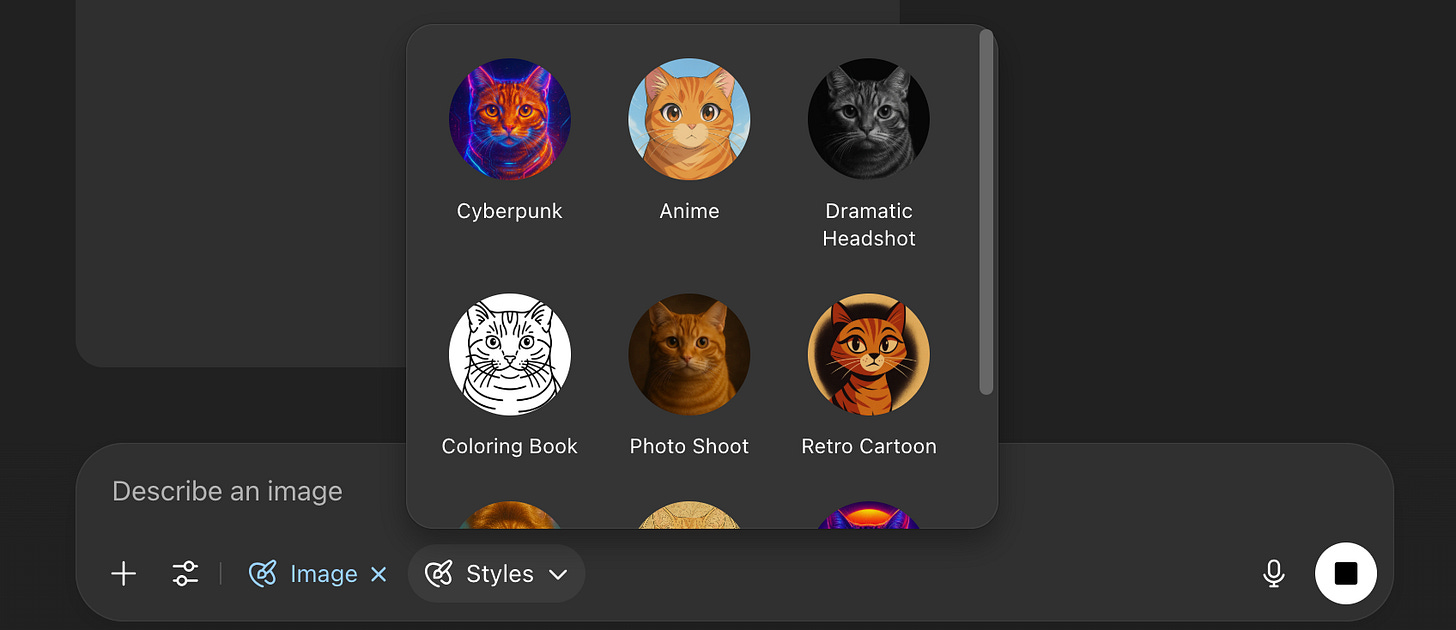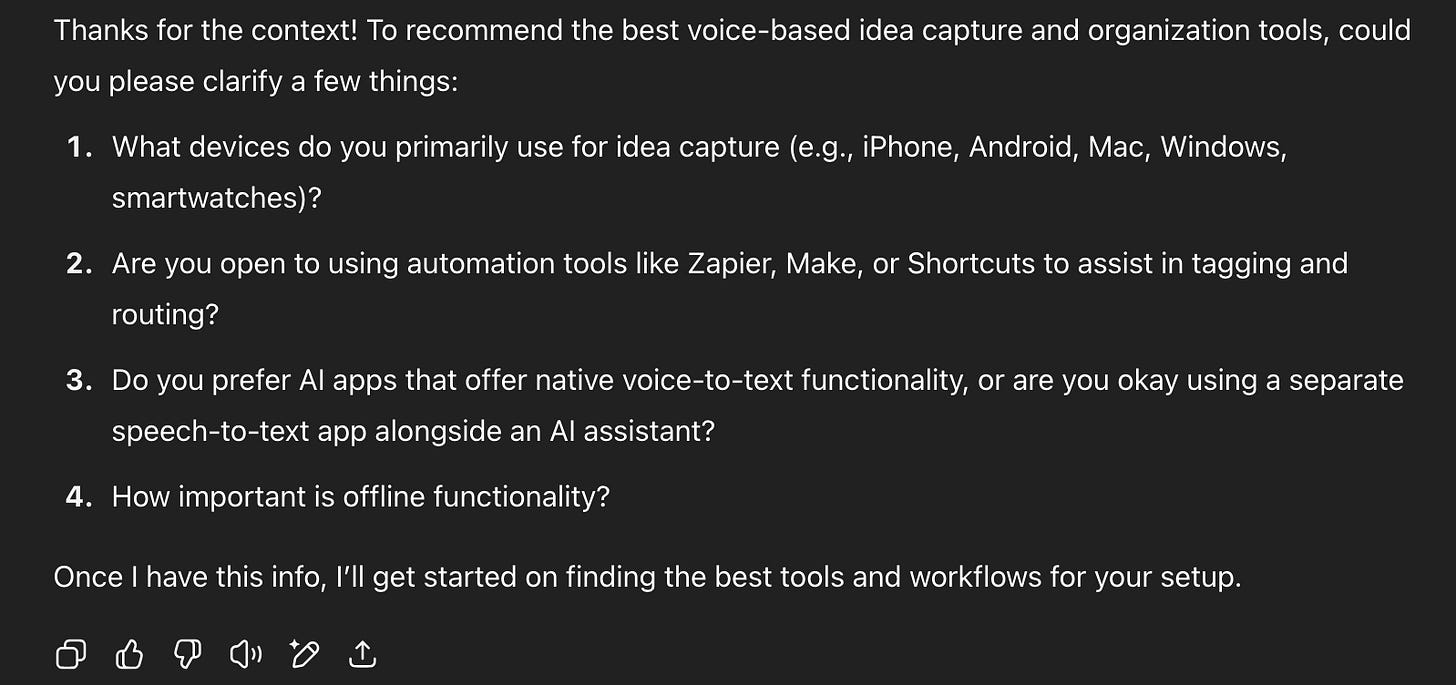I’m on the lookout for a new way to do idea capture (think note-taking on steroids) and I read that OpenAI just introduced ChatGPT Record.
So I decided to fork over twenty-three euros of my hard-earned cash to the darling of Silicon Valley for a ChatGPT Plus subscription. After two hours with ChatGPT—ChatGPTing?—I decided to swiftly cancel said subscription.
What I found was a loose collection of potentially useful features (with an emphasis on potentially), none of which I would pay for on their own:
A Deep Research feature that produced research output closer to Tom’s Guide than an in-depth literature review.
Image and video generation features that lacked the nuance, depth, quality, speed and controls of Midjourney or Veo 3.
A Projects feature that looks like its UI had been put together in after hours by one of Silicon Valley’s lesser-paid interns.
I did enjoy talking to their darkly sarcastic Monday GPT, and the voice mode is much better than in the Gemini Advanced app—much more polished and nuanced.
But at least from my brief interactions with ChatGPT it seems that OpenAI’s product strategy can be best summarised (without AI) as “let’s see what sticks”.
I was also disappointed by the fact that Operator wasn’t available in Plus—though not nearly disappointed enough to fork out the 229 euros they charge for their Pro plan.
The whole thing lacks coherence
These brief interactions with the most used AI app in the world have done nothing but reinforce my belief that we’re nearing a cliff when it comes to AI hype.

If the most used AI app in the world is a horrid mess of half-baked 20% product ideas, I’m scared for the people using this app—how are they getting any meaningful results?
Let me know in the comments if you have—would love to know!
I mostly use my AI assistant for desk research (for coding, video generation and data analysis I use standalone applications) so that’s the only feature I evaluated in detail.
This is the prompt I used for both ChatGPT and Gemini Advanced Deep Research:
I an an AI architect, startup founder, agency owner, Youtube creator, and I write a weekly Substack newsletter on AI and automation topics. What I'm missing is a way to quickly capture ideas using voice mode in a way that let's me organise the ideas with minimal effort — with different buckets for different types of content and categories for business and project ideas.
I'm currently using three Notion pages and writing everything down manually, which is far from ideal. What could be a better way to do idea capture and instant labeling? Ideally i use one of the availble AI apps (Gemini Advanced, ChatGPT or Claude), but if this isn't an option i want to hear alternatives. I'm based in the Netherlands so certain options and features won't be available to me at the moment.
I like how ChatGPT asked me follow-up questions before starting its research:
… but was mostly underwhelmed by the output of the deep research (linked here).
I found its written output terse, and it lacked the structure needed for easy scanning (why would I want to read 8 long paragraphs of AI-generated content?).
In the end it seemed to base its recommendations on domain authority by copying over the content of the most prominent blogposts it found with web search, rather than try to figure out what would work best in my particular case.
It could well be that I’m biased due to my extensive usage of Gemini Advanced (and the fact it is bundled into my Google Workspace subscription for free), but I found its Deep Research output to be much more balanced and easy to scan.
Anyway, definitely not enough of a game changer to make me want to fork out EUR 23/mo for a ChatGPT Plus subscription—and most definitely not enough to convince me of the value of the EUR 229/mo for the Pro subscription.
Besides the fact that ChatGPT seems to serve primarily as an AI hype box, the “everything assistant” a lot of major AI companies are currently gunning for could well turn out to be an elusive pipe dream.
AI was never a feature
Just like tech for tech’s sake was never a good idea, neither is AI for AI’s sake.
To AI just to look cool might gain you some early adopter points you can convert into social credit in select circles of the SF thought space, but it doesn’t make your life better in any other way—AI companions feed into social isolation etc etc..
My guess is that the most successful AI apps of the next few years won’t be general purpose tools like ChatGPT, but rather specific, purpose-driven tools designed from the ground up to incorporate AI into workflows that let users improve the quality, speed and quantity of real-world outcomes.
No doubt will this lead to the rise of specific UX, UI and design languages to help facilitate the integration of AI into workflows tailored around research, learning, education, data analysis, coding, app building, workflow automation and so on.
Either way, I’m a lot less bullish on OpenAI after taking the (paid) tour.
They’re falling further and further behind to Microsoft and Alphabet in the race for AI domination, and the gap will continue to grow if they don’t start unbundling their offering into mature, standalone products soon.
Let me know in the comments what that something else is!
Last week in AI
The ARC Prize Foundation previewed ARC-AGI-3, which will feature novel game environments. The new benchmark will test capabilities like exploration, goal-directedness, and memory, moving beyond the static reasoning tasks of previous versions. The full benchmark is expected to be released in 2026.
Google’s Veo 3 video generation model is now available to developers through the Gemini API and Vertex AI. This new model can generate high-definition video with synchronized audio, including dialogue, music, and sound effects, all in a single step.
OpenAI introduced ChatGPT Agent, a new feature that allows the assistant to autonomously complete complex tasks from start to finish. This "agent mode" gives ChatGPT access to a virtual computer, including a browser and terminal, to navigate websites, analyze data, and create documents.
Anthropic launched a new Connectors Directory for its AI assistant, Claude. Connectors make it easier to integrate popular applications like Google Drive, Slack, Notion, and Canva. This directory allows users to browse, install, and manage these integrations without needing any coding knowledge.
OpenAI created a stir by announcing that one of its unreleased AI models achieved a gold medal-worthy score at the 2025 International Mathematical Olympiad (IMO). The announcement, made on social media, came before the official results were released and without formal cooperation with the IMO, leading to criticism that it overshadowed the human competitors.
Meta is embarking on an ambitious plan to build several multi-gigawatt AI datacenter clusters, with the first, named "Prometheus," slated to come online in 2026. Following Prometheus will be "Hyperion," a project with the potential to scale up to an enormous 5 gigawatts of power. These "titan clusters" are part of Meta's massive investment in AI infrastructure to support its newly formed Superintelligence Labs and stay at the forefront of AI development.






Interesting review, Jonas! Would be interesting to read about Microsoft CoPilot at some point :o)
Brilliantly candid. Thanks for sharing 🌞